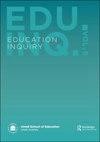Education “through” sustainable development in Swedish school-age educare – exploring how SAEC is responding to ESD in daily practices
IF 1.6
Q2 EDUCATION & EDUCATIONAL RESEARCH
引用次数: 0
Abstract
This article aims to explore how extended education in Sweden, School-age educare (SAEC), is responding to education for sustainable development (ESD), since these two educational practices have not that often been combined nor related in research. The exploratory findings are based on a small-scale case study in one municipality; including three in-depth examples from practice. The results reveal different kind of activities in the centres visited, as well as different approaches to education for sustainable development within SAEC. The cases show activities related to traditional outdoor environmental education, to social justice and global issues, and also as meaning making through play-based activities. The results were further analysed in relation to core concepts within extended education as well as ESD, exploring the “missing link”, but also new possibilities of ESD when part of an extended educational practice. The main conclusion of the analyses is that SAEC activities related to ESD offers education through sustainable development by active participation in various forms and contexts, as also currently suggested in policy and by scholars. By explicitly focusing ESD in the educational context of Swedish school-age educare, a missing link in this area of research was pinpointed paving the way for further research, and increased awareness in practice.瑞典学龄教育中的“通过”可持续发展的教育——探索SAEC如何在日常实践中应对可持续发展教育
本文旨在探讨瑞典的扩展教育,即学龄教育(SAEC)如何响应可持续发展教育(ESD),因为这两种教育实践在研究中并不经常结合或相关。探索性发现是基于一个城市的小规模案例研究;包括三个深入实践的例子。调查结果显示,所访问的中心开展的活动种类不同,SAEC内部开展可持续发展教育的方法也不同。这些案例展示了与传统户外环境教育、社会正义和全球问题有关的活动,以及通过基于游戏的活动产生的意义。研究结果进一步分析了扩展教育和可持续发展教育的核心概念,探索了“缺失的环节”,以及作为扩展教育实践一部分的可持续发展教育的新可能性。分析的主要结论是,与可持续发展教育相关的SAEC活动通过各种形式和背景的积极参与提供可持续发展教育,这也是目前政策和学者所建议的。通过明确地将可持续发展教育放在瑞典学龄教育的教育背景下,我们找到了这一研究领域中缺失的一个环节,为进一步的研究铺平了道路,并在实践中提高了认识。
本文章由计算机程序翻译,如有差异,请以英文原文为准。
求助全文
约1分钟内获得全文
求助全文
来源期刊

Education Inquiry
Social Sciences-Sociology and Political Science
CiteScore
5.00
自引率
0.00%
发文量
34
 求助内容:
求助内容: 应助结果提醒方式:
应助结果提醒方式:


